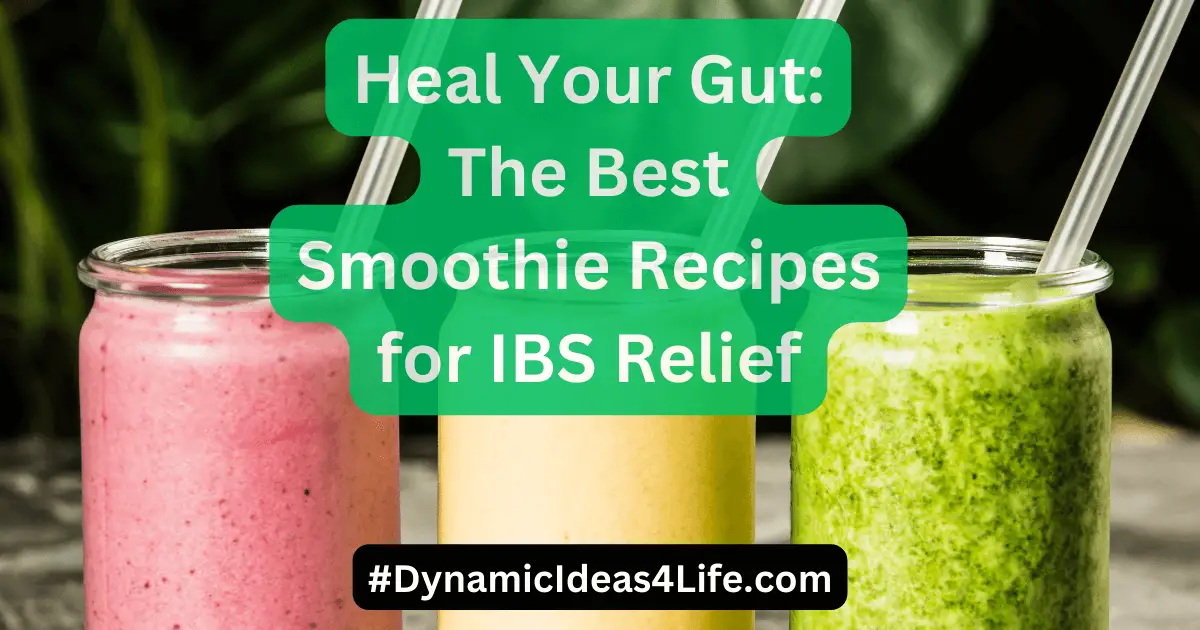Have you considered trying out any Smoothie Recipes for IBS relief? For IBS sufferers one of the main causes of flare-ups is our diets. There are certain foods that we should both avoid and vice versa.
Some foods and drinks, such as certain smoothie recipes may actually help manage IBS symptoms better. Knowing how to make the right smoothie recipes can have a plethora of different health benefits and this includes helping to lessen the aches and pains of an Irritable Bowel.
For those affected today, we will be sharing 6 different recipes that you can easily make with nothing more than a few simple ingredients and your blender/juicer.
Please keep reading if you would like to see how these smoothie recipes for IBS can help you>>
Heal Your Gut: The Best Smoothie Recipes for IBS Relief
Irritable Bowel Syndrome (IBS) is a common gastrointestinal disorder that affects the functioning of the digestive system. It is characterized by symptoms such as abdominal pain, bloating, diarrhea, and constipation.
These symptoms can have a significant impact on a person’s quality of life and overall well-being. One way to manage IBS symptoms is through dietary changes, and smoothies can be a helpful tool in this regard.
Smoothies are a popular choice for those with IBS because they are easy to digest and can be customized to include ingredients that are gentle on the digestive system.
By incorporating nutrient-rich ingredients into a smoothie, individuals with IBS can support their gut health and potentially alleviate some of their symptoms.
Understanding the Gut-IBS Connection: How Smoothies Can Help
The gut-IBS connection refers to the relationship between the health of the gut and the development and management of IBS symptoms.
The gut is home to trillions of bacteria, collectively known as the gut microbiome, which play a crucial role in digestion and overall health.
In individuals with IBS, there is often an imbalance in the gut microbiome, leading to symptoms such as inflammation and altered bowel movements.
Certain foods can trigger or exacerbate IBS symptoms, such as high-fat foods, caffeine, alcohol, and processed foods. Smoothies can help manage IBS symptoms by delivering nutrients in an easily digestible form.
The blending process breaks down the fibers in fruits and vegetables, making them easier for the body to absorb.
This can help reduce the strain on the digestive system and minimize symptoms such as bloating and discomfort.
The Power of Healing Foods: Why Smoothies are Ideal for IBS
Certain foods have healing properties that can benefit those with IBS. For example, ginger has anti-inflammatory properties and can help soothe an irritated digestive system.
Bananas are rich in potassium and can help regulate bowel movements. Oatmeal is a good source of soluble fiber, which can help alleviate constipation.
Smoothies are an ideal way to incorporate these healing foods into the diet. By blending them together, individuals with IBS can create a nutrient-dense drink that is easy to consume and digest.
Smoothies can also be customized to include other ingredients that are beneficial for gut health, such as probiotics and fiber-rich foods.
Gut-Friendly Ingredients: Choosing the Right Foods for Your Smoothies
When making smoothies for IBS management, it is important to choose ingredients that are gentle on the digestive system.
Some gut-friendly ingredients include:
Low-FODMAP fruits: Fruits such as bananas, berries, and citrus fruits are low in fermentable carbohydrates known as FODMAPs, which can trigger IBS symptoms in some individuals.
Leafy greens: Spinach and kale are rich in vitamins, minerals, and antioxidants that support gut health.
Yogurt: Probiotic-rich yogurt can help restore the balance of bacteria in the gut and improve digestion.
Chia seeds: Chia seeds are a good source of fiber (and Magnesium), which can promote regular bowel movements and reduce IBS symptoms.
Turmeric: Turmeric has anti-inflammatory properties and can help reduce inflammation in the gut.
By selecting these gut-friendly ingredients, individuals with IBS can create smoothies that not only taste delicious but also helps support their digestive health.
Soothing Smoothie for IBS (Recipe #1): Banana, Ginger, and Oatmeal Blend
Ingredients:
1 ripe banana
1-inch piece of fresh ginger
1/2 cup cooked oatmeal
1 cup almond milk (or any other non-dairy milk)
1 tablespoon honey (optional)
Instructions:
1. Peel the banana and chop it into chunks.
2. Peel the ginger and grate it using a fine grater.
3. In a blender, combine the banana, ginger, oatmeal, almond milk, and honey (if using).
4. Blend until smooth and creamy.
5. Pour into a glass and enjoy!
This soothing smoothie is packed with gut-friendly ingredients.
The Banana provides potassium and fiber, while the ginger helps soothe the digestive system.
The Oatmeal adds soluble fiber, which can help alleviate constipation.
Almond milk is a non-dairy alternative that is easy to digest for those with lactose intolerance.
The Honey adds a touch of sweetness, but it can be omitted for those who prefer a less sweet smoothie.
Read Related Post: How To Make Fermented Lemon, Garlic, and Honey Detox Tea Drink
Gut-Healing Greens (Recipe #2): Spinach and Kale Smoothie for IBS Relief
Ingredients:
1 cup spinach
1 cup kale
1/2 cucumber
1/2 green apple
1/2 lemon (juiced)
1 cup coconut water
Instructions:
- 1. Wash the spinach and kale leaves thoroughly.
- 2. Peel the cucumber and chop it into chunks.
- 3. Core the green apple and chop it into chunks.
- 4. In a blender, combine the spinach, kale, cucumber, green apple, lemon juice, and coconut water.
- 5. Blend until smooth and creamy.
- 6. Pour into a glass and enjoy!
For anyone seeking IBS relief this green smoothie is packed with nutrients that support gut health.
Spinach and kale are rich in vitamins A, C, and K, as well as minerals such as iron and calcium.
Cucumber adds hydration and a refreshing taste, while green apple provides natural sweetness.
Lemon juice adds a tangy flavor and can help promote digestion.
Coconut water is hydrating and can help replenish electrolytes.
Probiotic Powerhouse (Recipe #3): Gut-Healing Smoothie with Yogurt and Berries
Ingredients:
1 cup plain yogurt
1/2 cup mixed berries (such as blueberries, raspberries, and strawberries)
1 tablespoon honey (optional)<br>- 1/2 cup almond milk (or any other non-dairy milk)
Instructions:
1. In a blender, combine the yogurt, mixed berries, honey (if using), and almond milk.
2. Blend until smooth and creamy.
3. Pour into a glass and enjoy!
This probiotic-rich smoothie is perfect for supporting a healthy gut microbiome.
*Yogurt contains live cultures of beneficial bacteria that can help restore the balance of bacteria in the gut.
*Berries are low in FODMAPs and provide antioxidants that support gut health.
*Honey adds a touch of sweetness, but it can be omitted for those who prefer a less sweet smoothie.
~ Side Note: Good quality Organic Honey is high is known to be a source of both antioxidants and antiinflammatories – both things that can possibly help improve IBS symptoms.
Fiber-Rich Delight (Recipe #4): Blueberry and Chia Seed Smoothie for IBS Management
Ingredients:
1 cup frozen blueberries
1 tablespoon chia seeds
1 tablespoon almond butter
1 cup almond milk (or any other non-dairy milk)
1 tablespoon honey (optional)
Instructions:
- In a blender, combine the frozen blueberries, chia seeds, almond butter, almond milk, and honey.
- Blend until smooth and creamy.
- Pour into a glass and enjoy!
This fiber-rich smoothie is packed with ingredients that promote regular bowel movements and reduce IBS symptoms.
*Blueberries are rich in fiber and antioxidants that support gut health.
*Chia seeds are a good source of soluble fiber, which can help alleviate constipation.
*Almond butter adds healthy fats and protein, while almond milk is easy to digest for those with lactose intolerance.
*Honey adds a touch of sweetness, but it can be omitted for those who prefer a less sweet smoothie.
Anti-Inflammatory Elixir (Recipe #5): Turmeric and Pineapple Smoothie for Gut Health
Ingredients:
1 cup of pineapple chunks
1 teaspoon turmeric powder
1/2 teaspoon ginger powder
1 cup coconut water
1 tablespoon honey (optional)
Instructions:
1. In a blender, combine all the Ingredients.
2. Blend until smooth and creamy.
3. Pour into a glass and enjoy!
This anti-inflammatory smoothie is perfect for reducing inflammation in the gut.
*Turmeric has been used for centuries in traditional medicine for its anti-inflammatory properties.
*Pineapple contains an enzyme called bromelain, which can help reduce inflammation and improve digestion.
*Ginger adds a spicy kick and can help soothe an irritated digestive system.
*Coconut water is hydrating and can help replenish electrolytes. Honey adds a touch of sweetness, but it can be omitted for those who prefer a less sweet smoothie.
Gut-Soothing Smoothie Bowl (Recipe #6): A Delicious Recipe for IBS Sufferers
Ingredients:
1 frozen banana
1/2 cup frozen berries (such as blueberries, raspberries, and strawberries)
1/2 cup spinach
1/4 cup almond milk (or any other non-dairy milk)
Optional: Toppings of your choice (such as granola, sliced fruit, nuts, or seeds)
Instructions:
1. In a blender, combine all the Ingredients!
2. Blend until smooth and creamy.
3. Pour the smoothie into a bowl.
4. Top with your favorite toppings, such as granola, sliced fruit, nuts, or seeds.
5. Enjoy with a spoon!
This smoothie bowl is not only delicious but also soothing to the digestive system.
*The frozen banana provides a creamy base, while the frozen berries add natural sweetness and antioxidants.
*Spinach adds a boost of vitamins and minerals, as well as fiber.
*Almond milk is easy to digest for those with lactose intolerance. The toppings add texture and additional nutrients, such as fiber and healthy fats.
Tips for Incorporating Smoothies into Your IBS Diet
Here are some practical tips for incorporating smoothies into your daily routine:
1. Start with Small Portions: If you are new to smoothies or have a sensitive digestive system, start with small portions and gradually increase the amount as your body adjusts.
2. Experiment with Ingredients: Don’t be afraid to try new ingredients and combinations to find what works best for you.
Everyone’s digestive system is different, so it’s important to listen to your body and make adjustments as needed.
3. Use low-FODMAP fruits: If you are following a low-FODMAP diet, choose fruits that are low in fermentable carbohydrates, such as bananas, berries, and citrus fruits.
4. Add Healthy Fats and Protein: To make your smoothie more filling and balanced, consider adding ingredients such as nut butter, avocado, or Greek yogurt for healthy fats and protein.
5. Drink slowly and mindfully: Take your time to savor your smoothie and chew it if possible. This can help stimulate digestion and promote better nutrient absorption.
6. Customize to fit your dietary needs: If you have specific dietary restrictions or preferences, feel free to customize the recipes to fit your needs.
For example, you can use a different type of milk or substitute ingredients that you are allergic to or intolerant to.
In Conclusion
Smoothies can be a valuable tool in managing IBS symptoms and supporting gut health.
By incorporating healing foods into a blended drink, individuals with IBS can provide their bodies with easily digestible nutrients that can help alleviate symptoms such as bloating, abdominal pain, and irregular bowel movements.
Whether it’s a soothing smoothie with banana, ginger, and oatmeal or a gut-healing green smoothie with spinach and kale, there are countless options to choose from.
By experimenting with different ingredients and recipes, individuals with IBS can find the perfect smoothie to support their digestive health and overall well-being.
So why not give it a try and start incorporating smoothies into your IBS diet today? Your gut will thank you!


Anxiety and Depression best ways to lower blood sugar BiOptimizers blood pressure supplements blood sugar support supplements Digestive Enzymes Supplement digital products Dr Sam Robbins Erectile dysfunction Exercise Gut Health Healthy Living heart health HFL how to lower blood sugar levels How To Lower Cholesterol insulin resistance joint health supplement Keto keto dieting Keto Diet Weight Loss leaky gut supplements leptin resistance list Magnesium deficiency Matt Gallant mental health multivitamins Nootropics nutrient supplements Probiotics Probiotic Supplements proteolytic enzymes reverse type 2 diabetes stress and anxiety stress relief vitabalance vitapost Wade Lightheart weight loss articles weight loss diet plans weight loss product reviews weight loss supplements weight loss supplements that work weight loss tea
